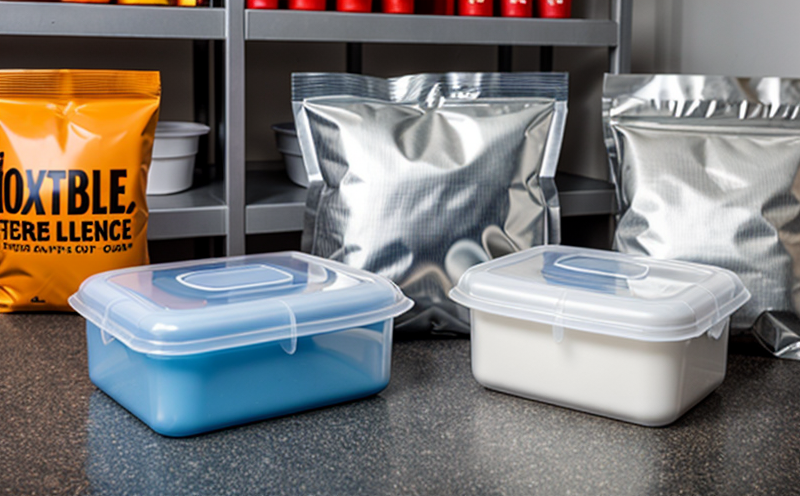ISO 11607-3 Seal Integrity Assessment
The ISO 11607 series of standards provides a framework for testing packaging materials used in medical device and pharmaceutical industries. Specifically, ISO 11607-3:2018 outlines the procedure for determining the seal integrity of flexible packaging using air under pressure. This test is critical to ensure that packages meet their intended design specifications and prevent contamination or leaks.
The primary goal of this assessment is to evaluate the ability of a seal to withstand environmental stresses without compromising its integrity. Seal integrity testing is particularly important in industries where sterility and containment are paramount, such as medical device manufacturing and pharmaceutical packaging. Failure to maintain proper seals can lead to product recalls, legal issues, and significant financial losses.
The test involves subjecting the sealed package to a defined pressure differential between the inside and outside of the package. The air is then released, and the rate at which air escapes from the package is measured as an indicator of seal integrity. This process helps identify any weaknesses or defects in the packaging that could compromise product quality.
For accurate results, the sample preparation is crucial. Typically, this involves cutting specific sections of the packaging material according to predefined dimensions and ensuring the seal area is intact before testing. The test setup includes a pressure chamber, air supply system, and measurement devices capable of detecting small amounts of air leakage.
The acceptance criteria for passing ISO 11607-3 are stringent. A pass/fail decision is made based on the rate of air loss from the package during pressurization. Typically, packages that allow less than a specified threshold (e.g., 5 ml/min) to escape are considered acceptable.
Real-world applications of this test include ensuring the integrity of medical device packaging before sterilization and shipping. It is also used in pharmaceutical packaging to confirm that vials or ampoules remain sealed during transportation and storage. In addition, seal integrity testing helps manufacturers identify potential flaws in their production processes, leading to improved quality control.
The following table provides an overview of the key aspects of ISO 11607-3:
| Aspect | Description |
|---|---|
| Test Methodology | Application of pressure to sealed packages and measurement of air loss. |
| Sample Preparation | Cutting specific sections from the packaging material, ensuring seal integrity. |
| Pressure Range | Typically 100 kPa ±2.5 kPa for medical device and pharmaceutical packages. |
| Air Loss Threshold | Less than 5 ml/min is generally acceptable, but this can vary by industry standard. |
| Measurement Accuracy | High-precision measurement devices are essential for accurate results. |
| Test Environment | Controlled temperature and humidity to simulate real-world conditions. |
The test setup must be carefully calibrated and maintained to ensure consistent and reliable results. This includes regular calibration of pressure gauges, air supply systems, and measurement devices. Proper training for operators is also critical to avoid errors in sample preparation or test execution.
Quality managers and compliance officers rely on ISO 11607-3 seal integrity assessments to maintain high standards within their organizations. By ensuring that all packaging materials meet the required specifications, they can prevent costly product recalls and protect consumer safety.
Applied Standards
- ISO 11607-3:2018 – Determination of Seal Integrity of Flexible Packaging.
- ASTM F2095 – Standard Test Method for Determining the Seal Strength and Seal Integrity of Bag-in-Box Containers.
The ISO 11607 series of standards is widely recognized for its comprehensive approach to evaluating packaging integrity. The specific application of ISO 11607-3 makes it an essential tool for industries dealing with sterile and controlled environments, such as medical device manufacturing and pharmaceutical packaging.
The ASTM standard mentioned above provides additional insights into seal strength and integrity testing, complementing the ISO standards. Together, these standards form a robust framework for ensuring that flexible packaging meets all necessary quality and safety requirements.
Eurolab Advantages
- Expertise and Experience: Eurolab’s team of experts has extensive experience in packaging testing, including seal integrity assessments. Our technicians are trained to follow the latest industry standards accurately and consistently.
- State-of-the-Art Equipment: We invest in high-quality equipment that meets or exceeds international standards, ensuring precise measurements and reliable results.
- Comprehensive Reporting: Eurolab provides detailed reports with clear interpretations of test results. Our reports are designed to help quality managers and compliance officers make informed decisions about product quality.
- Custom Solutions: We understand that every industry has unique testing needs, so we offer customized solutions tailored to your specific requirements. Whether you need a one-time assessment or ongoing testing services, Eurolab can meet your needs.
At Eurolab, our commitment is to provide the highest level of service and support for all packaging integrity tests. Our experienced team works closely with clients to ensure that every test is conducted according to the latest standards and best practices.
Environmental and Sustainability Contributions
- Reduced Waste: By ensuring that packages meet their design specifications, ISO 11607-3 tests help prevent product recalls. This reduces waste associated with reprocessing or replacing defective products.
- Energy Efficiency: Properly sealed packages can reduce the need for additional protective measures during transportation and storage, leading to more efficient use of resources.
The seal integrity assessment plays a crucial role in promoting sustainability by minimizing environmental impact. By ensuring that packaging materials are used effectively, manufacturers can contribute to reducing waste and conserving natural resources. This is particularly important in industries where the carbon footprint of products is a significant concern.





